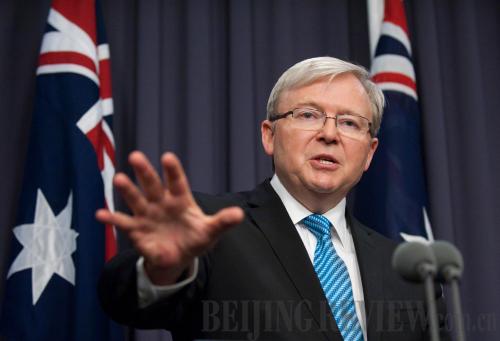|
 |
|
PRESS DEBUT: Australian Prime Minister Kevin Rudd speaks at his first press conference after taking office in Canberra on June 28 (BAI XUE) |
Three years and two days later, Kevin Rudd is back. On June 26, Rudd beat Julia Gillard to become head of the Australian Labor Party. One day later, he was sworn in as prime minister. To secure his position, Rudd must lead the Labor Party to victory in the coming parliamentary elections. He'll need to plot a strong election strategy at home and deploy a stable diplomatic policy as well.
Return of Rudd
This is Rudd's second stint as Labor Party prime minister. He became prime minister of Australia in 2007 after leading the party winning the parliamentary elections, but was later overthrown by Gillard on June 24, 2010. Observers said the Labor Party has turned to Rudd for support to keep its ruling party status.
Wang Zhenyu, a researcher with the China Institute of International Studies, told Beijing Review that as Gillard's approval rating had been sliding in recent months, the Labor Party sensed impending defeat in the parliamentary elections this year. According to polls taken prior to Gillard's ouster, the Labor Party's approval rating had dropped to 29 percent, while the opposition Conservative Party's rose to 48 percent. The widening gap forced the Labor Party to make its final decision.
Wang concluded that there are two major reasons behind Gillard's departure: policy delivery and internal party politics.
"Gillard's carbon tax policy offended the interests of big Australian enterprises. These enterprises thus determined to bring her down," said Wang. Previously, Gillard enacted the carbon tax in a bid to gain needed support from the minority Green Party, betraying her campaign promise. The government claimed the move was a necessary weapon against climate change. Australia is one of the world's worst greenhouse gas emitters per capita. While the policy caused many objections, Wang pointed out that the government's recent fiscal budget is difficult to carry out due to the country's struggling economy.
Previous poll results showed that the Labor Party's approval rating had been sliding entering 2013. It was predicted that if Gillard continued at the helm, her party could lose the ruling status by 20 seats to the Conservatives in the coming campaign. Rudd has been more popular with voters, even when he was brought down by Gillard in June 2010, said Guo Chunmei, a researcher on Australian studies with the China Institutes of Contemporary International Relations.
Internal political wrangling is a long tradition of the Labor Party, whose leaders generally are surrounded by their own supporters. For example, Rudd was toppled as prime minister by Gillard in her internal coup three years ago. Additionally, some key cabinet members quit when Gillard stepped down, leading Rudd to announce his own cabinet lineup in early July.
Internal disintegration was a key factor behind Gillard's stepping down. Although the Labor Party has common interests and governing ideas, high-ranking leaders have different opinions on specific questions, said Wang.
Guo said that differing interests, policy stances and personalities have caused internal separation of the Labor Party, and the trend is much more obvious than it was three years ago. "Under the pressure of campaigning, the conflict is too pronounced to be ignored," she said, adding that the competition between Rudd and Gillard hasn't let up in the past three years.
A tight race
Rudd's victory brings more hope to the Labor Party. Under Gillard, the party's prospects at this year's elections seemed doomed. But recent polls suggest the race has tightened since Rudd returned to the front. The latest poll result shows that the approval rating of the Labor Party rose to 35 percent, while that of the opposition dropped to 43 percent. According to a survey of potential prime minister candidates, Rudd got a high approval rating of 49 percent, far exceeding Conservative opposition leader Tony Abbott's 35 percent.
| 